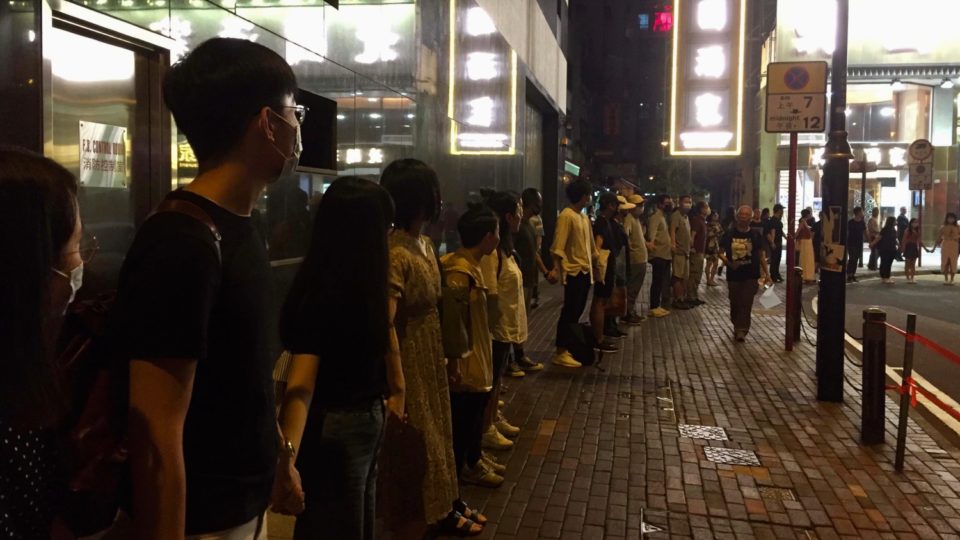Pro-democracy protesters were expected to take to the streets of Hong Kong on Saturday in defiance of a police ban on a major rally, a day after several leading activists and lawmakers were arrested in a sweeping crackdown.
The demonstration had been due to mark the fifth anniversary of Beijing’s rejection of a call for universal suffrage in the semi-autonomous city, sparking the 79-day Umbrella Movement in 2014.
Police banned Saturday’s rally on security grounds after last weekend saw some of the most violent clashes in three months of political turmoil, but still warned residents to expect “severe disruption”.
The warning came after at least five high-profile activists and three lawmakers were arrested one after the other on Friday on accusations linked to the protests, in a sweep that lasted late into the night.
Two of the Umbrella Movement’s leaders, Joshua Wong and Agnes Chow — both still well-regarded among the city’s youth — were arrested in early morning swoops and appeared later in court accused of “inciting others to take part in unauthorized assembly” among other charges.
Wong railed against the “chilling effect” of the round-up of opponents of Hong Kong’s Beijing-backed government, but vowed to continue fighting.
Authorities are “trying to create white terror” to scare people away from participating in the movement, he said — using a phrase that has gained traction among protesters accusing the government of using harassment to suppress dissent.
The European Union’s diplomatic chief Federica Mogherini said the developments were “extremely worrying”.
And US President Donald Trump said Washington’s economic pressure on China was responsible for preventing the authorities from carrying out a harsher crackdown against demonstrators.
Amnesty International decried the “ludicrous dawn swoops”, describing them as “scare tactics straight out of Beijing’s playbook”.
Protesters sidestep ban
Despite organizers of the banned march cancelling Saturday’s rally, protesters have said they will still take to the streets.
“The mass arrests yesterday were an obvious tactic to scare us off. Instead, (the government) lures us to come out today and then they can start their second round of mass arrest,” said a protester online.
As demonstrators were arranging how to sidestep the ban, some called for mass “shopping trips”, while a YouTuber with 800,000 followers called a fan meeting.
However, in a blow to those efforts, LIHKG, the Reddit-like forum used by protesters to communicate, reported via Twitter that its app had suffered the “largest attack it has ever seen”.
The demonstrators, who have earned a reputation for their creativity, have also said they will hold small religious gatherings, which do not require permission for groups of up to 30 people, for the “sinners of Hong Kong”.
A senior police official said the force remained braced for the possibility of renewed clashes with a hardcore minority of the mainly student protesters.
Sweeping round-up
Friday saw rolling arrests of leading pro-democracy voices, including three members of the city’s parliament — Cheng Chung-tai, Au Nok-hin and Jeremy Tam.
Cheng’s arrest was announced by his Civic Passion party, while police confirmed a 35-year-old man surnamed Cheng had been held over “conspiracy to cause criminal damage” linked to the storming of the city’s parliament in July.
Police confirmed the arrests of lawmakers Au and Tam for their roles in “obstructing” officers when riot police cleared protesters from the streets of the densely populated Mong Kok neighborhood on July 7-8. Au is also accused of assaulting a police officer.
Pro-democracy campaigner Rick Hui — a district councilor — and former student leader Althea Suen were also arrested separately on Friday, while vocal independence campaigner Andy Chan was detained at Hong Kong’s airport.
Police spokesperson John Tse denied the slew of arrests were timed specifically to de-fang the weekend’s protests.
More than 900 people have been arrested since June in connection with protests, which were sparked by opposition to a now shelved bill allowing extraditions to mainland China that quickly morphed into wider calls for democracy.
Hong Kong’s crisis-hit government has refused to back down over the protests, which have seen millions march peacefully through the streets but also hardcore groups of radical protesters hurl bricks and petrol bombs at police armed with tear gas and rubber bullets.
The violence has damaged Hong Kong’s reputation for stability and prosperity.
China has responded with a campaign of intimidation. State media on Friday reported that fresh military anti-riot drills were held across the border in Shenzhen.




